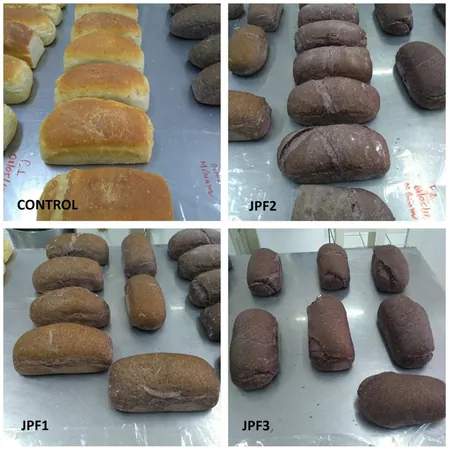
Unlocking Health Benefits: Jabuticaba Peel Bread Could Be a Game Changer for Diabetics!
2024-12-09
Author: Emma
Introduction
In a groundbreaking study from the State University of Campinas (UNICAMP) in São Paulo, Brazil, researchers have discovered a revolutionary sourdough bread enhanced with jabuticaba peel that could significantly aid those grappling with diabetes or anyone needing to manage their blood sugar levels. The full details of this innovative research have been published in the journal Foods.
The Need for Healthier Bread Options
The research highlights a pressing issue: traditional bread, rich in carbohydrates, can lead to sharp spikes in blood sugar, potentially resulting in hyperglycemia—a condition that many are striving to avoid. With the pandemic of unhealthy eating habits and rising diabetes cases, there’s an increasing demand for healthier bread options. Artisanal bakers are exploring new formulations that not only enrich the nutritional profile of their products but also promote a lower glycemic response through fermentation.
Nutritional Benefits of Jabuticaba Peel Bread
The incorporation of jabuticaba peel flour into the bread recipe boosted the fiber content by over 50% and dramatically increased its antioxidant capacity—by approximately 1.35 to 3.53 times, depending on the amount of jabuticaba peel used. This nutrient enhancement not only improves the bread's health benefits but also makes those nutrients more bioavailable for absorption in the body.
Study Findings and Metabolic Response
In a pivotal crossover trial, participants consumed both traditional long-fermentation bread and the jabuticaba-enhanced version, a week apart. The findings were notable: the standard bread caused blood sugar levels to peak 30 minutes post-consumption, remaining elevated for an additional 15 minutes. However, the jabuticaba-infused bread resulted in a lower peak—occurring after 45 minutes—and the decline of blood sugar levels was more gradual, lasting two and a quarter hours.
Implications for Health
Understanding how bread influences metabolic responses is crucial, as blood sugar spikes can lead to serious health issues in the long term. Bruno Geloneze, a key figure in the research and a professor at UNICAMP, explains, "Lowering post-meal spikes in sugar and insulin can reduce the risk of developing diabetes and associated conditions like heart disease. This could also preserve the function of insulin-producing cells in the body."
Sensory Evaluation
The study not only focused on metabolic benefits but also addressed sensory aspects. Cinthia Cazarin, who supervised the research, noted the challenge of maintaining the technological and nutritional qualities of the bread while working with jabuticaba flour, which possesses unique sensory characteristics that needed careful evaluation during the bread-making process.
Antioxidant Benefits of Jabuticaba
The antioxidant effects of jabuticaba peel are particularly important, as they are linked to phenolic compounds, like anthocyanins, which not only give the fruit its rich dark color but also play a vital role in health improvements. Conserving the bioactive properties during processing is essential to maximize these health benefits.
Satiety and Blood Sugar Levels
Participants reported feeling fuller one hour after consuming bread made with jabuticaba peel compared to the regular version. This increase in satiety is often associated with slower returns to baseline blood sugar levels, a hallmark of foods with a lower glycemic index.
Shelf Life and Preservation
A significant discovery from the study was the extension of the bread's shelf life to seven days, a feat attributed to the natural preservatives derived from the properties of jabuticaba peel and the fermentation process utilized. This not only enhances the product's longevity but helps inhibit the growth of harmful bacteria.
The Future of Jabuticaba Research
The jabuticaba fruit itself, acclaimed for its health benefits, is a treasure trove packed with phenolic compounds and dietary fiber known for their cholesterol and blood sugar-regulating properties. Research into the fruit's benefits continues, with ongoing studies exploring its effects on insulin resistance and the promotion of GLP-1—a hormone integral to digestion, satiety, and glucose regulation, similar to those produced by diabetes medications.
Moving Towards Further Innovations
As scientists delve deeper into the potential of jabuticaba's bioactive compounds, they are moving toward in vivo trials with animal models to uncover additional benefits, such as potential roles in combatting depression and preventing colorectal cancer.
Conclusion
This remarkable study not only paves the way for healthier bread alternatives but opens doors to further innovations in nutrition that could transform how we think about everyday food. Stay tuned as this research develops, because the future of healthy eating may very well hinge on a humble fruit!









 Brasil (PT)
Brasil (PT)
 Canada (EN)
Canada (EN)
 Chile (ES)
Chile (ES)
 España (ES)
España (ES)
 France (FR)
France (FR)
 Hong Kong (EN)
Hong Kong (EN)
 Italia (IT)
Italia (IT)
 日本 (JA)
日本 (JA)
 Magyarország (HU)
Magyarország (HU)
 Norge (NO)
Norge (NO)
 Polska (PL)
Polska (PL)
 Schweiz (DE)
Schweiz (DE)
 Singapore (EN)
Singapore (EN)
 Sverige (SV)
Sverige (SV)
 Suomi (FI)
Suomi (FI)
 Türkiye (TR)
Türkiye (TR)